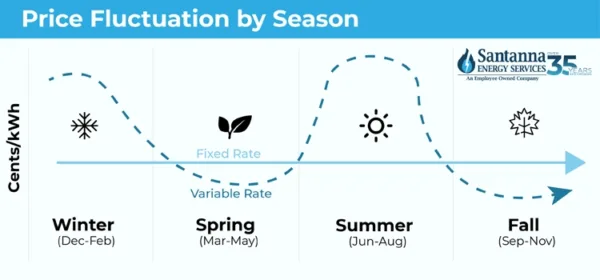Fixed vs. Flat vs. Variable – Energy Plans Compared
by Greg Rabaey
10.4 min read

Have you ever wondered what the difference is between a Fixed–Rate energy plan, Flat-Fee, and a Variable Rate energy plan? Don’t fear, it’s not as complicated as you might think. When choosing an energy plan for your home it’s important to understand these differences. Here are some key concepts to understand when choosing a Fixed rate, Flat fee, or Variable rate plan for your home energy.

What is a Fixed-Rate Energy Plan?
A fixed- rate energy plan is an energy plan that provides customers with a rate that does not change for a specified period. The rate is not subject to changes in supply and demand, inflation etc. This type of plan offers customers the stability of knowing what their energy costs will be for the duration of the term. Moreover, this plan is also helpful during times when prices fluctuate, like in summer or winter when gas and electricity rates can increase. With a fixed-rate plan, the price that you locked in when you first signed your contract won’t change in fluctuating markets.
How the Pricing Works: Fixed-Rate Natural Gas
Let’s say hypothetically, you sign up for a 12-month Fixed Rate plan for natural gas at $0.6900 per ccf*. If you generally use around 100 ccf of natural gas per month, your estimated monthly bill for your natural gas supply would be an estimated $69.00 per month. A key thing to remember is that some months you will likely use less than 100 ccf of natural gas in your home. And in other months, you might use more than 100 ccf of natural gas. So, your total monthly bill on your natural gas supply could fluctuate depending on the month of the year. But with Fixed– Rate plans, the price per ccf ($0.6900) does not change during the entire term in months of the contract (12 months).
In other words, from the date that you enroll in a Fixed– Rate plan, you get the same price per ccf ($0.6900), fixed, for the entire duration of the contract term length (one example of that might be a 12– month plan).
How the Pricing Works: Fixed-Rate Electricity
Electricity is priced a little bit differently than natural gas. For a Fixed– Rate electricity plan, the example scenario above is similar, except that electricity is measured in kWh (kilowatt-hours). So, let’s say hypothetically, you sign up for a 12-month Fixed Rate plan for electricity at 8 cents per kWh*. If you generally use around 1000 kWh of electricity per month, your estimated monthly bill for your electricity supply would be an estimated $80 per month (8 cents times 1000 kWh).
In the same way as you might use natural gas, you might use less electricity some months, and more electricity in other months. Your total monthly bill for your electricity supply could change depending on how much electricity you use. But the rate per kWh still stays the same or “fixed” for the duration of your contract term (in this example, for 12 months).
Advantages of a Fixed-Rate Energy Plan
A fixed-rate energy plan, also known as a fixed-rate electricity or fixed-rate natural gas plan, offers several advantages to consumers. The key benefit is that it provides price stability and predictability over a specified period.
Price Stability: The most significant advantage of a fixed-rate energy plan is that it provides price stability. You won’t have to worry about fluctuations in energy rates, even if there are sudden rate spikes in the market.
Predictability: With a fixed rate, you’ll have a clear understanding of your monthly energy bills, which makes it easier to manage your finances and plan for the future.
Protection from Seasonal Fluctuations: Some regions experience significant seasonal variations in energy prices due to factors like weather conditions. Fixed-rate plans shield you from these fluctuations.
Disadvantages of a Fixed-Rate Energy Plan
While fixed-rate energy plans offer several advantages, they also come with some disadvantages and potential drawbacks.
Potentially Higher Initial Costs: Fixed-rate plans may have higher initial costs compared to variable-rate plans or market-based pricing, especially when energy market prices are low. Or in other words, while a variable-rate plan might start with a lower rate, it may change in the upcoming months, which can makeit more expensive.
Limited Flexibility: Fixed-rate plans offer less flexibility when it comes to taking advantage of changing market conditions. You may be locked into a set rate for an extended period, which can be a disadvantage if market prices drop significantly, and/or if you prefer to track rates each month.
Potential Higher Costs: In some cases, consumers on fixed-rate plans may pay more on a monthly basis for their energy, especially if the contracted rate is set above prevailing market prices. This can result in higher bills.
What is a Variable-Rate Energy Plan?
A variable– rate energy plan, also known as a month-to-month plan, is an energy pricing structure that offers consumers flexibility and adaptability through shorter contract term lengths. Unlike fixed-rate plans, where you pay a consistent rate for energy over a specified period, variable-rate plans are subject to fluctuations in the energy market. This means that the rate you pay for your energy can change from month to month, depending on market conditions and supply and demand.
What are the Advantages of a Variable-Rate Energy Plan?
Variable– rate energy plans offer several advantages for consumers who are comfortable with shopping for rates each month and the associated risks:
Potential Cost Savings: One of the key advantages of variable-rate plans is the potential for cost savings during times of low energy prices. If energy prices in the market are below the fixed rates offered in other plans, you can benefit from lower monthly bills.
No Long-Term Commitment: Variable-rate plans typically do not lock you into long-term contracts. This flexibility allows you to change providers or switch to different plans at any time without incurring early termination fees. It’s important that some companies do provide longer-term variable rate contracts. It’s always important to confirm.
Ability to Respond to Market Changes: With a variable-rate plan, you can adapt to changing energy market conditions. Since it’s a shorter-term length typically, this means you can hop from plan to plan. When prices are low, you can take advantage of the lower rates.
What are the Disadvantages of a Variable-Rate Energy Plan?
Price Volatility: The most significant disadvantage of variable-rate plans is their price volatility. Energy prices can fluctuate significantly from month to month, leading to unpredictability in your monthly energy bills.
Budget Uncertainty: Variable-rate plans make it challenging to budget accurately since your energy expenses can vary widely. In addition, staying ahead of variable rates can be difficult and requires one to track and research rates on a frequent basis.
No Protection from Market Spikes: With a variable-rate plan, you are exposed to market price spikes without any safeguard or cap on how much you pay for energy. This risk can lead to unexpected financial strain during times of high energy demand or market instability.

What is a “Flat” Energy Plan?
Flat-fee energy bills, sometimes also known as Unlimited Energy plans, offer consumers the convenience of paying a flat fee for the energy supply portion of their bill With flat energy bills, regardless of how much energy you consume*, your monthly supply cost remains the same, providing budget predictability. Unlike variable or fluctuating energy plans, flat-fee plans eliminate the uncertainty associated with seasonal variations in energy consumption and market price fluctuations. Just keep in mind, although your supply cost remains the same, the utility may assess other fees.
What are the Advantages of a “Flat” or “Unlimited” Energy Plan?
Flat-fee energy plans offer several advantages for consumers:
Predictable Monthly Expenses: With a flat-fee bill, you know exactly how much you will pay each month for your supply cost, regardless of your energy consumption. * This predictability makes budgeting and financial planning more straightforward.
No Surprises: You won’t be affected by fluctuating energy prices, seasonal variations in energy consumption, or unexpected price hikes. The supply portion of your bill remain consistent throughout the year, eliminating the stress of unexpected cost increases.
No Need for Close Monitoring: With a flat-fee plan, you don’t need to constantly monitor your energy consumption or make adjustments to reduce usage, as you would with variable-rate plans.
What are the Disadvantages of a “Flat” Energy Plan?
While flat energy plans offer several advantages, they also come with some disadvantages that consumers should consider:
Potentially Higher Costs: Flat-fee plans can be more expensive if you do not use much energy, which may not be cost-effective for some households.
Availability Constraints: Flat energy plans might not be offered by all energy providers or may only be available in certain areas. This can limit your options and make it challenging to find a suitable plan if you prefer a flat-rate structure. Additionally, all plans will have eligibility requirements, meaning if your historical or current usage exceeds their parameters, you won’t be eligible.
What to Keep in Mind Regardless of Your Plan Choice
No matter if you’re choosing a fixed-rate, flat-fee, or variable plan for your electricity or natural gas supply, it’s important to note that your fixed-rate, flat-fee, or variable-rate plan applies to your supply charge only. Whether your needs are with natural gas or electricity, there are other fees in your fixed-rate, flat-fee or variable-rate that can vary month-to-month and can be dependent on usage amounts, such as taxes, fees and surcharges. Regardless of if you receive your service through a supplier, these utility charges will still apply separately. Keep in mind that some utilities or suppliers may charge a subscription fee or administration fee. Lastly, specifically with flat-fee plans, don’t forget that even though your supply charge remains the same, there still could be other fees associated with your plan assessed by the utility. Be sure to read your contact details and ask your provider about any extra charges.
How to Determine What Plan is Right For You?
Here are a couple of things you can do to help you with your decision:
Assess Your Energy Needs: Determine exactly what your energy needs are. Are you looking for electricity or gas to power your home? Or maybe both? No matter your needs, it’s important to know what you need for your home so you can narrow down the right energy plan.
Determine If You Have Any Energy Patterns: Energy patterns play a crucial role in which energy plan you choose. Energy prices sometimes change based on peak hours of the day when energy is used the most. If you align with energy peak hours, you risk paying more.
Conduct an Energy Audit: Energy audits allow you to assess if you’re losing energy in your home through testing for things like air leaks or insufficient insulation. Often, energy audits may lead to your home needing repairs and renovations which might affect your energy budget and your choices for an energy plan if you need more stability.
Research Providers: Investigate various energy providers in your area. Check their reputations, how long they’ve been in business, customer reviews, and plans that are available for you to help you with your decision process.
Choosing the right energy plan for your home or business depends on your specific needs, budget, and risk tolerance. Fixed-energy plans offer stability and predictability but may not provide the best deal if energy prices decrease. Flat-Fee plans simplify budgeting but may not be available to all consumers. Variable-energy plans offer flexibility but come with price volatility and uncertainty but with the right research, choosing an energy plan can be easy! If you still have questions about what to choose, consider downloading our ebook about everything you need to know about choosing an energy plan!
Santanna Energy Services specializes in easy natural gas & electricity plans tailored to your home energy needs in the United States; providing services to Illinois, Indiana, Pennsylvania, Michigan, and Ohio. We provide a wide range of energy services and products to meet the needs of both residential and small business customers. Our mission is to provide innovative and cost-effective energy solutions that will help our customers achieve their energy goals. With over 35 years of experience, we are committed to creating life-long relationships by providing quality service to customers, communities, and employees.
*Prices are subject to change
Greg Rabaey, the CEO of Santanna Energy Services, is a forward-thinking leader with a wealth of experience in the energy industry. With a solid educational foundation in mathematics, computer science, and physics, including a Ph.D. in Physics from the University of Arizona, Greg's career spans over 30 years in technology and energy. Under his guidance, Santanna Energy Services has evolved into a consumer-centric powerhouse, providing electricity and natural gas to countless homes across the Midwest. Greg's strategic acumen, deep commitment to his team and customers, and passion for innovation have been instrumental in the company's growth. His visionary leadership has led Santanna to become an industry innovator, offering a range of earth-friendly and unlimited energy options, setting new standards in environmentally conscious energy solutions for clients. Beyond the boardroom, he actively contributes to his community, embodying his dedication to driving positive change, both professionally and personally.







